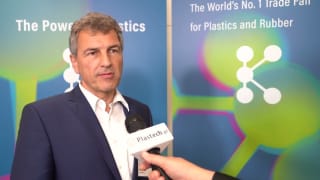Tanzawa says he has been growing the entire organisation by 2-digit percentages since he became CEO & President at Fanuc Europe in 2016, “but our revenue is growing even faster”. He says he inherited a situation of most volume coming from Western Europe, but sees much potential in faster growing Central and Eastern European countries, where automation is now becoming increasingly important, due both to investment by Western European companies and shortages of qualified staff. Fanuc wants to hire high quality staff for its offices in Romania and Slovakia (both established in 2017) and Serbia (opening in 2018).
Within 7,000 employees worldwide, Fanuc has 1,450 employees in Europe and 21 subsidiaries. Most staff (300) are in Germany, followed by France, Italy, UK, and Spain. Other subsidiary offices are smaller, with 30-50 employees, with 40 each in Poland and Hungary, where a new 4,000 sqm office was recently built: “Installing robots and IMMs requires a lot of space and space is needed for customer training too”, Tanzawa explains, as exemplified by the new “Fanuc academy” in Stuttgart, Germany.
Fanuc also retains and seeks agencies in countries with subsidiary offices. It is all worthwhile, as although Tanzawa can’t reveal the value of the IMM business, he says consolidated revenue of the entire Fanuc group in Europe as a whole amounts to around one billion Euro, or 15-25% of worldwide revenue, depending on fluctuations in other markets like China, etc.
Tanzawa admits, “We haven’t done enough on communication to the customer in the past, we aim to do it in a better way now”. Also he wants to improve the internal communication between Fanuc robot, machine tool and IMM businesses. This would provide more benefits for customers, including working closely with the new robotics branch set up in Regensburg, Germany in August 2018.
But although Tanzawa seeks to benefit customers with overall Fanuc “plug-and-play” solutions, it is not easy to offer, as robots are sold largely via system houses and Tanzawa does not really want to interfere with that. This makes it difficult to target sales to end-users, who can potentially use different types of Fanuc equipment.
Potential benefits are clear, as seamless combination of IMMs and robots enables plastics processors to work round the clock in “lights-out shifts” for higher output and at lower cost.
And although Roboshots are by no means inexpensive, Fanuc’s European technical Support Manager, Darren Whittall, points to their low total cost of ownership, on account of low maintenance and long life, not to forget inconvenience and costs associated with hydraulic IMMs in handling filters and keeping the machines and mould shop clean. Tanzawa added that “our IMMs are therefore cheaper, despite higher initial cost, when you look at the long-term return on investment [ROI]”. I am sure, when customers get benefits from Fanuc IMMs, they don’t want to change, as they already trust the machines”.
An important aspect to high efficiency and low cost production is also working to Industry 4.0 Internet of the Things (IoT) principles. Fanuc started promoting its own version in Japan in 2017: FIELD (Fanuc Intelligent Edge Link & Drive), and it will come to Europe in 2019. FIELD focuses on inter-equipment communication via fast in-factory networks, as Tanzawa says this is faster in data collection than cloud-based solutions and better addresses customer concerns on data security.
Fanuc developed its own application within FIELD predicting when e.g. motor and robot faults and excessive deviations may occur in future. It encourages using Fanuc control system analysis information with deep learning artificial intelligence (AI) for this purpose. Whittall says this results in zero robot and IMM downtime (Fanuc’s ZDT approach), by ensuring spare part availability when needed, for maximum machine utilisation, as well as “ensuring that a robot doesn’t do something detrimental to its own health”.
Tanzawa is not concerned about the effect of Brexit on UK business. To the contrary, customer enquiries show it is already making many UK processors realise how much they need automation to maintain and improve competitiveness. Whittall said “time will tell, but we will continue our UK business, as long as there are users of FANUC products”. He stressed that Fanuc has received large orders in the UK since the Brexit referendum, supported by a large expansion of facilities at Fanuc UK.
Tanzawa found Fanuc’s overall potential in Europe was higher than expected when he was appointed CEO, having worked in Fanuc’s European robotics business beforehand. He summarises “Financial strength is natural for Fanuc, as it has a good amount of cash: I want to use it to invest. That will give confidence to customers, more importantly to the employees too, so we can hire good quality staff”.
High cash reserves enable high inventories, with e.g. 3,000 robots stocked in Luxembourg compensating for 1.5 months shipment time from Japan. Fanuc had been cutting robot and IMM inventories before Tanzawa became CEO, but he then immediately took action to boost stock levels. “As long as we have products in stock, I am convinced we can sell them standing up to and outperforming competition also on delivery time”, Tanzawa explains.



